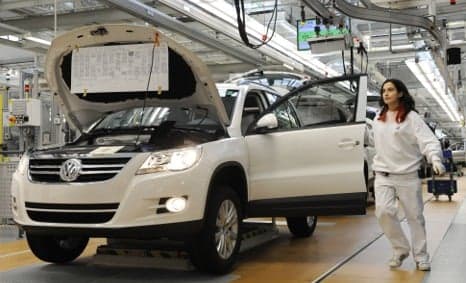Volkswagen agrees to 3.2 percent pay hike

Carmaker Volkswagen said Tuesday it had agreed to a 3.2 percent wage hike with trade union IG Metall, setting a key benchmark for Germany's booming economy.
VW and IG Metall also agreed on a one-off bonus equal to one percent of a worker's annual pay, with a minimum payment of €500 ($680), a statement said.
The pay increase is to take effect on May 1, effectively bringing it forward by eight months, Volkswagen added.
"The company and IG Metall have found a fair solution that offers a very decent rise in pay while preserving competitiveness," VW personnel director Horst Neumann was quoted as saying.
IG Metall official Hartmut Meine said "the conclusion of this agreement takes into consideration the solid economic situation of major European car makers and compensates personnel for their performance."
The agreement is valid for 16 months.
Auto analyst Frank Schwope at NordLB bank said it came at the right time for VW, which can profit from a global revival in auto sales without fear of labour unrest throwing a wrench into the works.
Like its German rivals, VW had thousands of its employees work shorter hours during the global economic slowdown while unions kept pay demands to a minimum to preserve jobs.
With auto production on the rise again, companies like VW and parts group Bosch have sought ways to repay staff for their sacrifice without eroding their own competitive positions.
"The agreement between VW and IG Metall should serve as a symbol for the entire auto sector and similar deals with car and parts makers would not be surprising, in particular owing to stronger inflation in recent months," Schwope said.
Last week, the national statistics office said German salaries rose by an average of 1.4 percent last year, although workers in the key manufacturing sector benefited from an average increase of 4.4 percent.
Falling unemployment and higher wages are expected to encourage consumption in Germany, the biggest economy in Europe, and help redress trade imbalances with eurozone partners.
AFP/adn
Comments
See Also
VW and IG Metall also agreed on a one-off bonus equal to one percent of a worker's annual pay, with a minimum payment of €500 ($680), a statement said.
The pay increase is to take effect on May 1, effectively bringing it forward by eight months, Volkswagen added.
"The company and IG Metall have found a fair solution that offers a very decent rise in pay while preserving competitiveness," VW personnel director Horst Neumann was quoted as saying.
IG Metall official Hartmut Meine said "the conclusion of this agreement takes into consideration the solid economic situation of major European car makers and compensates personnel for their performance."
The agreement is valid for 16 months.
Auto analyst Frank Schwope at NordLB bank said it came at the right time for VW, which can profit from a global revival in auto sales without fear of labour unrest throwing a wrench into the works.
Like its German rivals, VW had thousands of its employees work shorter hours during the global economic slowdown while unions kept pay demands to a minimum to preserve jobs.
With auto production on the rise again, companies like VW and parts group Bosch have sought ways to repay staff for their sacrifice without eroding their own competitive positions.
"The agreement between VW and IG Metall should serve as a symbol for the entire auto sector and similar deals with car and parts makers would not be surprising, in particular owing to stronger inflation in recent months," Schwope said.
Last week, the national statistics office said German salaries rose by an average of 1.4 percent last year, although workers in the key manufacturing sector benefited from an average increase of 4.4 percent.
Falling unemployment and higher wages are expected to encourage consumption in Germany, the biggest economy in Europe, and help redress trade imbalances with eurozone partners.
AFP/adn
Join the conversation in our comments section below. Share your own views and experience and if you have a question or suggestion for our journalists then email us at [email protected].
Please keep comments civil, constructive and on topic – and make sure to read our terms of use before getting involved.
Please log in here to leave a comment.